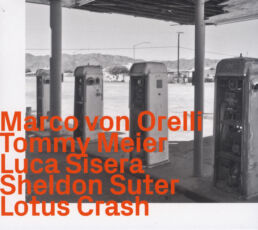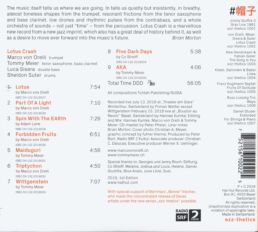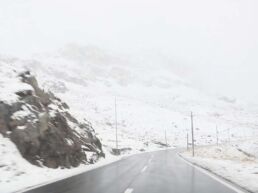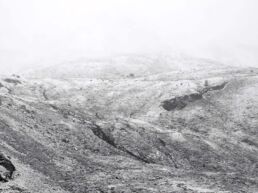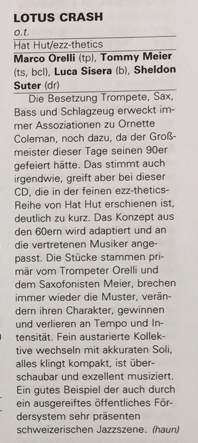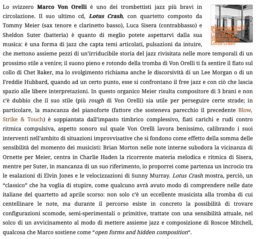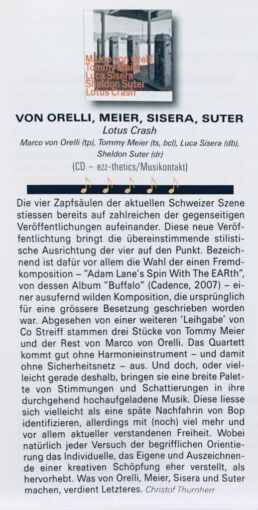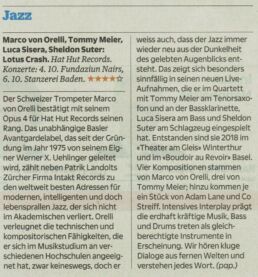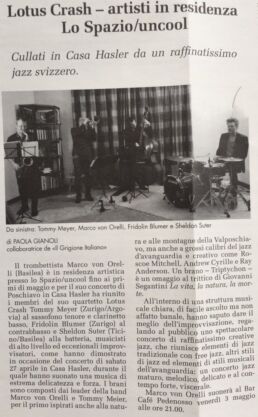Lotus Crash recordings
Lotus Crash
Hat Hut Records Ltd. – ezz-thetics 1002
Released September, 2019
Bruce Lee Gallanter says:
Right from the opening song “Lotus”, the quartet sounds like they are playing one of those South African/spiritual jazz grooves. Mr. Meier’s tenor sax has that wonderful, dark, probing Trane-like tone which will make you feel better instantly. He takes a short introductory solo before Mr. Von Orelli takes over on trumpet, slowly, assuredly floating on top like a butterfly with the blues. The rhythm team has that swell William Parker/Hamid Drake-like sound, hypnotic and most stirring. Mr. Von Orelli writes strong, memorable melodies which feel like some sort of spiritual medicine. One of Downtown’s best bassists is Adam Lane, who is also a multi-bandleader and impressive composer. Mr. Lane’s “Spin with the EARth” is a great choice and fits perfectly with this quartet’s repertoire. It is a sort of Mingus or Mario Pavone—like bass-led piece with a few unaccompanied solo sections.
Lotus Crash Trailer
The respective musicians comprising this quartet have made the rounds across Europe`s fertile progressive jazz scene as leaders or valued sidemen for numerous entities, largely focused on generating an outside-the-box schema in various shapes, forms and colours. The band translucently shifts paradigms while bringing a signature mode of attack to the table, firmed up by bassist Luca Sisera`s stout and lyrical lines amid the quartet`s undulating deconstruction and rebuilding processes. – Glenn Astarita
Lotus Crash on the Road
There is an impressive statement from a visual artist from India. She hears this kind of improvised music for the very first time in her life and is deeply touched by it. Our music is not remote or complicated, but very direct and, above all, very narrative. Manfred Papst writes at the end of his review in the NZZ am Sonntag the inconspicuous but remarkable sentence: “We hear clever dialogues … and understand every word“.
What more could you want? We are convinced that even an unbiased audience that is not “of the trade” can “understand” this language.
With this in mind, our goal is to play in venues that attract more than just a specific jazz audience.
Some reviews
Marco von Orelli trat auch in unserem Land auf, Ende September 2021 beim Prague Free Jazz Festival mit Lotus Crash. Der Name der Band war ursprünglich der Titel des ausgezeichneten Albums, das der Tenorsaxophonist und Bassklarinettist Tommy Meier, der Kontrabassist Luca Sisera und der Schlagzeuger Sheldon Suter (mit Fridolin Blumer, der ihn in Prag vertrat) im Sommer 2018 mit Orelli aufgenommen haben.
Das Album ist eine fesselnde Sammlung von neun Titeln, hauptsächlich von Orelli und Meier. Die Ausnahme ist “Spin With The EARth”, geschrieben von Adam Lane, Kontrabassist und Komponist, einem Schüler von Anthony Braxton und Karlheinz Stockhausen. Treibende Sätze im Unisono, kontrapunktische Leadstimme von Trompete und Bassklarinette, die hier allein im Free-Jazz-Gewitter steht, wobei das explosive Kontrabass-Solo nicht fehlt. Der ausdrucksstarke Sound des Schweizer Quartetts oszilliert zwischen Hard Bop und Free Jazz, mit dichten Rhythmen, dynamisch reichen Sätzen und Bläsersoli, während die Trompete eher nachdenklich ist (das eröffnende “Lotus”, auch “Wittgenstein”). Aber seine Musik enthält viel mehr Vermischung und Subtilität. “Part Of A Light” mischt Jazz-Impressionen mit avantgardistischen zeitgenössischen Musikpraktiken, die er schließlich in einen dringenden, druckvollen Flow verwandelt. “Forbidden Fruits” beginnt mit einem meditativen Eintauchen, um schließlich über Anklänge an New Orleans, Swing und Be Bop zum Free Jazz durchzubrechen. “Maiduguri” baut auf einem schamanischen, minimalistischen Rhythmus auf, während “Triptychen” stark aufgelockert ist, mit einem wackelnden Bass, zunächst zaghaft, schließlich erdig. “Five Dark Days” sättigt eine unidiomatische Düsternis mit düster grollendem Bass, dann schält sich die Bassklarinette heraus, die Trompete säuselt und stürmt mit. “AKA” schließt das Album mit einem Refrain aus schwermütiger Trompete, pochendem Schlagzeug, einer minimalistischen Bassklarinettenfigur und einem ungemein bewegenden, unisono vorgetragenen Motiv.
Recorded live at venues in Switzerland, the respective musicians comprising this quartet have made the rounds across Europe’s fertile progressive jazz scene as leaders or valued sideman for numerous entities, largely focused on generating an outside-the-box schema in various shapes, forms and colors. The band translucently shifts paradigms while bringing a signature mode of attack to the table, firmed up by bassist Luca Sisera‘s stout and lyrical lines amid the quartet’s undulating deconstruction and rebuilding processes. Moreover, trumpeter Marco von Orelli and saxophonist Tommy Meier‘s sinewy groove-driven unison choruses along with odd-metered detours combine a sense of normalcy with offsetting maneuvers.
Sheldon Suter’s brisk and fluid drumming generates quite a bit of pop and nuance. And on works such as “Part of a Light” the band renders spiffy linear progressions, as the bassist and trumpeter traverse a horde of snaky mutations. Yet during other movements throughout the album the band takes its time to explore and reinvent, accomplished with various tempi. Occasionally, they underscore some of Ornette Coleman‘s free bop escapades, although they alter the pace on “Maiduguri,” commencing with a requiem-like gait, moving towards a steady pace, but colorfully contrasted by Meier’s bass clarinet phrasings atop the rhythm section’s looping ostinato, and consummated by the hornists’ bluesy intonations.
The final track, “Wittgenstein,” is nestled in the free zone, featuring the soloists’ gritty theme-building exercises, heightened with a rampage of sorts, where they thrust matters into 10th gear via a catchy melodic hook. Simply stated, the musicians cover a wide gamut of jazz-induced genre-bending activities sans any hint of filler material.
While it seems counterintuitive to begin an album review by discussing the liner notes, Brian Morton’s approach is spot on. Music like this, steeped in history but brimming with quiet instantaneous innovation, should be explored in terms of its details in smart context, which is exactly what he does. He’ll isolate a blues lick, rendering it the dual reference and signpost it certainly is, thereby micro-historicizing one fraught moment from these brilliant quartet performances by trumpeter Marco von Orelli, reedsman Tommy Meier, bassist Luca Sisera and drummer Sheldon Suter, and well he should. The group charges and roils, but relaxing in the post-Miles fashion is just as integral to the game.
There is detail a-plenty in which to revel and luxuriate. Listen to Sisera’s first note and subsequent octaves on “Forbidden Fruits” to get a flavor of his exquisite tone and for a recording to match. Yet, what good would detail be if not in the proper context, established as Sisera’s solo flows with understated ease into von Orelli’s wistful melody, first in hushed reverence and then swinging as Suder’s susurrating cymbals raise the tension. It all builds in energy and mystery only to be subverted by a pause, a tempo change and a slow return to relaxed swing, loping infectiously into von Orelli’s solo.
There are so many historical connotations in each moment of this set of concert recordings that to catalog them would be futile at best. Those Ornette Coleman piano-less groups certainly provide a timbral backdrop, but the melodies touch everything from “Nardis” to “Freedom Jazz Dance” and so much inbetween. The quartet can whisper, as already demonstrated, but this lion also roars. Sample “Wittgenstein” for some bringing of the proverbial noise, and I’m sure that no better examples of Meier’s bluesy scronk exist on record.
When all the detail’s been absorbed and all the deep historical scores settled, these four musicians can lay down a groove – pardon a shallow dive into the vernacular – like nobody’s business. If you don’t go walking away from “AKA” with a spring in your step and a smile stretching what Jack Kerouac so delicately called a skull cover, part of you has already expired. Sure, bass and clarinet sound like one instrument as von Orelli’s muted trumpet and whatever Suter’s hitting ride atop them with the assurance of mastery, but they’re all right there in that deep pocket. A set of music like this, that affords a smile, a tear and insight as deep, singular and complex as the music, is to be welcomed.
MARCO VON ORELLI With TOMMY MEIER / LUCA SISARE / SHELDON SUTER – Lotus Crash (Hat Hut Ezz-Thetics 102; Switzerland) Featuring Marco von Orelli on trumpet, Tommy Meier on tenor sax & bass clarinet, Luca Sisera on double bass and Sheldon Suter on drums. Most of the compositions here written by Mr. Von Orelli or Mr. Meier, aside from one by NY bassist Adam Lane and Swiss saxist Co Streiff. This is Mr. Von Orelli’s third disc for the Hat (Ezzthetics) label, after quintet and sextet CD’s from around 2015, a duo disc with Udo Schindler and a group known as Big Bold Black Bone (along with the drummer here). Swiss reeds player, Tommy Meier, has a band with Irene Schweizer called Root Down as well as being a member of another Swiss sextet led by Co Streiff. Bassist Luca Sisera in on a half dozen releases on the Intakt and Leo labels, as well as a CD as a leader called, ‘Prospect’.
Right from the opening song “Lotus”, the quartet sounds like they are playing one of those South African/spiritual jazz grooves. Mr. Meier’s tenor sax has that wonderful, dark, probing Trane-like tone which will make you feel better instantly. He takes a short introductory solo before Mr. Von Orelli takes over on trumpet, slowly, assuredly floating on top like a butterfly with the blues. The rhythm team has that swell William Parker/Hamid Drake-like sound, hypnotic and most stirring. Mr. Von Orelli writes strong, memorable melodies which feel like some sort of spiritual medicine. One of Downtown’s best bassists is Adam Lane, who is also a multi-bandleader and impressive composer. Mr. Lane’s “Spin with the EARth” is a great choice and fits perfectly with this quartet’s repertoire. It is a sort of Mingus or Mario Pavone—like bass-led piece with a few unaccompanied solo sections. Bassist Luca Sisera is featured throughout this piece and is in strong, spirited and inventive form, holding the piece together. While he solos, the horns sail in to play some haunting harmonies with him and the drummer. I must admit that I am a sucker for one of those cerebral, repeating, ritualistic, trance-like lines, which hold on and don’t let go. “Maiduguri” has one of those slow, sly, throbbing grooves which reminds me of a Native American chant. It sounds somehow simple but it pulls you right in and won’t let go. “Wittgenstein” has one of those great Blue Note like themes except that there is no piano, just tenor sax & trumpet up front. Yoou will be humming along immediately and smiling as well. This entire disc makes me smile, like sort of salve meant to wash away our blues. If you are tired of all of the bad news going round’, then you best grab this disc and play it with your loved ones. – Bruce Lee Gallanter, DMG
https://www.downtownmusicgallery.com/newsletter_detail.php?newsID=1791

